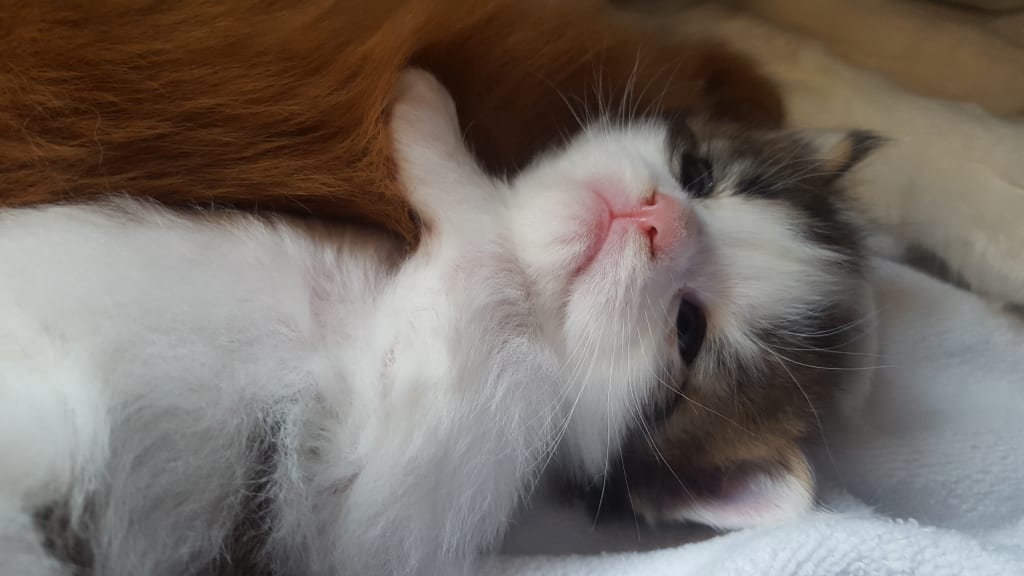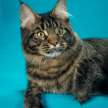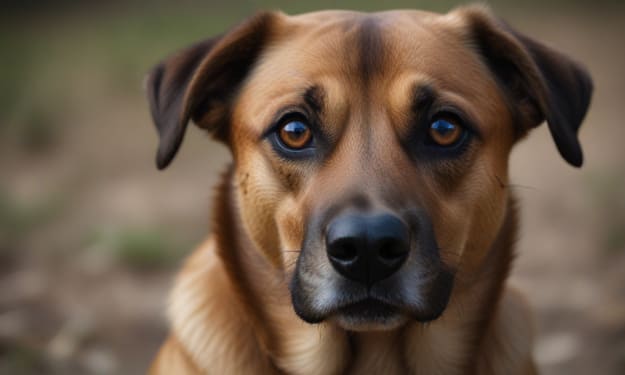
I'm not one for the lime light, but I am a Leo, in all technicality, and after 6 years in this practice, which is as taboo as sex work, I've decided to speak out. I generally let my work speak for itself, and I take pride in my academic and creative endeavors, which includes my cattery. So, I've opted to discuss a rather controversial topic that I've found the general public doesn't put much thought into or, if they've considered the matter, has a strong aversion to: the art of cat breeding.
Cat Breeding: the art of producing offspring in a closed population of feline
There is much that goes into this topic: I can speak to the breeding practices of Maine Coons with authority; the Maine Coon is America's largest native cat breed and is considered a working cat. (yes, like dogs, we have cat shows and not the absurdity Netflix put forth where one exhibitioner stood proudly sniffing their purported non-smelling cat poop; that [sorry, friends who believe] only perpetuated the crazy cat lady stereotype and yes, it did happen).
Cat breeding, at its core, involves the impregnation of a feline and the subsequent raising of kittens. To the general public, this means that there is a mama cat and daddy cat involved. To the breeder, this involves all sorts of terrifying terminology: inbreeding coefficients, hand-breeding, hemostats, nasal bulb, Snuggle Safe, hand-delivery, genetic databases, and more.
There are always the critics of the practice, who more than likely fall into two categories who I like to call:
1. The Uninformed Rescuers: the people who believe that cat breeds should not exist and that they promote unhealthy practices through increased inbreeding and propagation of congenital defects.
2. The Anti-Profiteers: the people who believe that running a cattery is akin to running a brothel and that cat breeders are madams making money off the backs of their cats. (My own mother once fell into this category, but after a half decade and realizing how much breeders love their cats, she's calmed down).
The Anti-Profiteers and the Uninformed Rescuers despise the cat breeders who they think do not care about their cats' health or wellbeing. In addition, these backyard breeders or kitten mills breed for profit at the expense of their cats and do not follow the guidelines or ethics put forth by the professional organizations (CFA, TICA) or breed associations (Maine Coon Breed Council). Reputable breeders would like them shut down too.
Reputable breeders, in contrast, breed for the love of the breed.
This is the principle of all good programs, which quiets the critics, and is the foundation of any cat breeder worth their salt. Cat breeders often say it as a creed, a greeting from one reputable breeder to another.
We breed for the love of the breed.
Let's break down this statement.
Disclaimer: we breed, so yes-- in all technicality, cat breeders do contribute to the overpopulation problem and, if someone truly believes that cat breeds, dog breeds, horse breeds, fish breeds, snail breeds, etc. should not exist for a working purpose and should only breed randomly without human intervention and where inbreeding does happen more frequently than thought, then we, cat breeders, do not have a rebuttal to our critic's argument. However, if someone sees the value of having a working cat, a cat bred for intelligence, a certain look and a certain temperament, that has genetically reinforced traits and does not have a problem with different breeds, then keep reading.
Breeding for the Health of the Cats
Reputable breeders, unlike the appropriately-despised backyard breeders, breed for the health of their closed population. To have a cat breed, a breeder, much like an animal conservationist, works with a closed population. We study pedigrees, and we study inbreeding coefficients. Robinson's Genetics for Cat Breeders and Veterinarians, 4th Edition, is our friend. Pawpeds allows us to track our cat's ancestry and is how we calculate our inbreeding coefficient (percentage). For Maine Coons, 10 generations is based on 2038 ancestors and reputable breeders know their lines.
In addition to our general knowledge, we take courses on cat genetics that teach us about breed disorders and genetic inheritance. Our breeding practices move our populations toward a healthier state while also retaining desirable traits, so we breed beyond the individual pair and instead-- breed for the breed of the cat.
The Cat Fanciers' Association of America (CFA) recognizes 45 distinct cat breeds and in each cat breed, breeders study a different set of factors affecting their population, ensuring line (and overall pedigree) health.
Beyond line health, a reputable breeder tests for major breed disorders. Pedigreed cats are at a risk for health problems, just like the rest of the feline population. But pedigreed breeds offer their humans an opportunity to study and research these disorders in a more focused environment. For example, hypertrophic cardiomyopathy (HCM) affects all feline populations, but it is more prevalent in Maine Coons. To combat this issue, reputable breeders not only DNA test (yes, we've teamed with the best veterinarians and research universities to discover specific genes that contribute to the disorder) but we annually echocardiogram and our vets take measurements of our cats' heart wall before they breed.
Some disorders are more easily tested for and eliminated from the population; they consist of a simple DNA test because our closed populations have allowed researchers to successfully identify particular alleles that enable the disorder. Functioning the same for all creatures (even humans), the DNA test results show whether a cat is a carrier or affected; if affected, the cat has the potential to pass the condition to its offspring if the pairing involves two affected cats. If the affected cat is bred to a non-affected cat, there is a chance the kitten will be a carrier. DNA testing allows breeders to respond to emerging genetic disorders that have been recently identified and allows populations to move away from potentially debilitating conditions. The Maine Coon has three major breed disorders for which I test: HCM, PK Deficiency (pyruvate kinase deficiency), and SMA. I conduct a lifetime DNA test on my breeding cats and complete the annual echocardiogram.
No cat breeder or cat owner wants a sick cat, and reputable cat breeders--responsible for bringing life into this world-- are sticklers for ensuring that their populations are as healthy as possible. I am proudly one of those sticklers.
Breeding for Conformation
Reputable cat breeders also breed for conformation, which means that certain genetic traits are expected in a particular breed. These traits range from certain colors to body type to coat consistency. When working with any breed, reputable breeders are expected to be familiar with breed standard.
Breed standards are governed through Breed Councils and overseen by the organization through cat shows. Most importantly, standard tells breeders what to aim for in their breeding programs and also teaches breeders what not to breed for.
The knowledge of what-to-breed-for and what-not-breed-for distinguishes reputable breeders from those with unethical practices.
For example, in the Maine Coon standard put forth by CFA, the Maine Coons' famous muzzle must be "visibly square, medium in length and blunt ended when viewed in profile." Additionally, it should be "rectangle," but should not appear to be tapering or pointed (A Maine Coon, after all is not a Norwegian Forest Cat, which has a triangular rather than rectangular shape). A chin lacking in depth, i.e. one that tapers from the jaw line to the lip, is not considered strong, firm or desirable.
CFA has a standard for every cat breed and it is the breeders' responsibility to ensure their cats meet confirmation. Too often, I lament the same issue that the anti-profiteers point to in their reasoning for ending cat breeds. Many, even the well-intentioned cat breeders, are not trained to standard. Cat breeders are on a continuum; not every backyard breeder is a mill and many just believe that their cat is so wonderful that it must just have one litter. The money is an aside, but the truth is: they still don't know why or for what they are breeding, and that-- sadly-- makes them not reputable because they are uninformed.
Breeding for Personality
Personality too is something that reputable breeders take into consideration and that has a genetic component. Cats inherit many things from their parents, including the ability of being good mothers. They also inherit temperament and each breed strives for a certain personality benchmark. Reputable breeders ensure their cats meet the personality standard set forth.
Let's Talk Money
Bad breeders breed at the expense of their animals for maximum profit. Good, reputable breeders balance profit and expense. I can't tell you there is no money in cat breeding; truthfully, like all animal husbandry, there is a business component. Some breeders take the philosophy that their cattery is a labor of the heart, and there's nothing wrong with that. They implement non-profit programs and invest their time, their hearts, and their energy. Other breeders see the cattery as an investment of their time and resources, and they compensate themselves accordingly.
I've too often seen the cat breeder painted as the devil for profiting off the natural process of their cats; rarely do I see anyone take into account the sacrifice of the cat breeder unless, of course, you belong to a thousand cat breeder groups where sympathy is offered from other cat breeders and breed enthusiasts.
What the public generally doesn't see is the cat breeders' investment: automatically, they're on-call for cat birth, the hours invested in continuing education, the colossal vet bills, the moments of joy, and the moments of heartbreak.
So the true question that should be asked, I feel, is this:
How much is your kitten's life worth?
I imagine this question also should be considered: How much do we pay our teachers? How about our vets? Our midwives?
Should we expect our breeders to work for free?
At the minimum, you should know that the reputable cat breeder puts proceeds toward cattery upkeep, including vet bills (mine are somewhere around $2900 this season, so far), and continuing education. Every little bit that you give from your wallet helps not only your cattery but the breed. Your purchase goes to providing a quality life for our cats and our kittens whether you realize it or not.
7 Steps to Choosing a Reputable Cat Breeder:
1. Do your research on the breed.
2. Send a formal inquiry to the cattery of your choice.
3. Know why you're choosing your breed and why you want to work with that cattery.
4. Expect a waitlist and make sure that you ask your breeder follows breed standard, health tests, and has a set of ethics.
5. Understand that in the cat world, you get what you pay for and that reputable breeders have a significant overhead in expense, which is why you'll find an average price for the market on a particular breed.
6. Choose a breeder who will keep in touch beyond the first twelve weeks. Most reputable breeders check in at least once a year and have a legally binding contract that you sign, which prevents their babies from being breed unauthorized, from being donated to a research lab, from being surrendered to a shelter (first refusal clause), and ensures a minimum standard of care. In addition, they provide a health guarantee in addition to normal veterinary care for the kittens' age.
7. Reputable cat breeders do not send kittens home before 12 weeks, up to 16.
About the Creator
бетани
Before I ever aspired to be an academic, I breathed words. In them, I found worlds of possibility and solace. Alongside conversation, I have imagination.






Comments
There are no comments for this story
Be the first to respond and start the conversation.